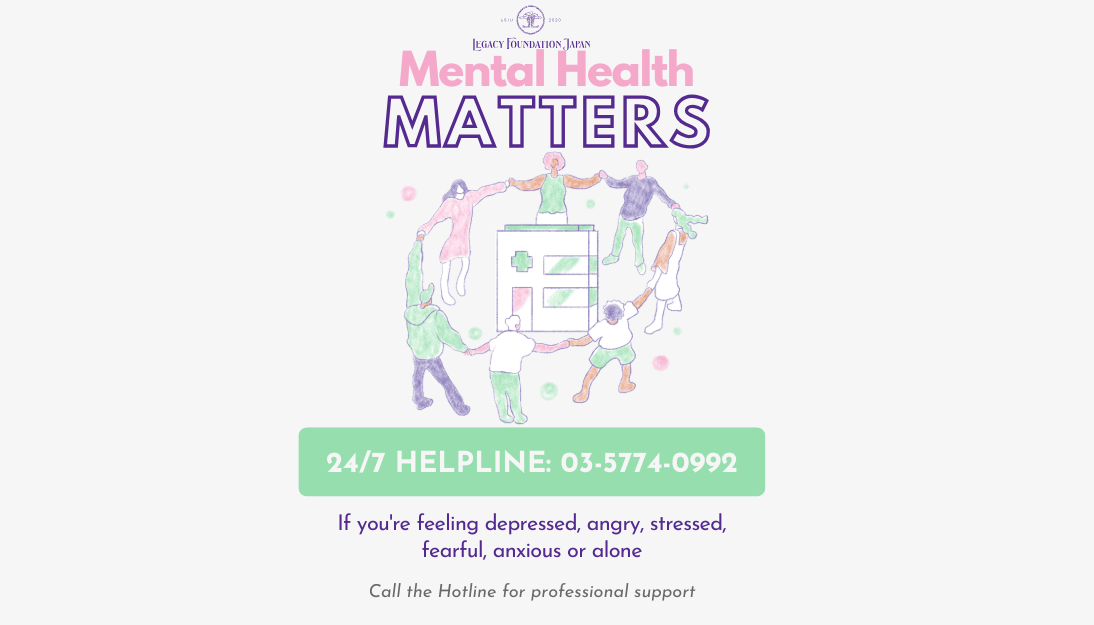- Legacy Foundation Japan
- Posts
- Mental Health in Japan: Awareness, Reflection, and Support
Mental Health in Japan: Awareness, Reflection, and Support
Legacy Foundation Japan

Introduction
Mental disorders contribute significantly to the disease burden in Japan. As of 2016, depressive disorders ranked 12th and self-injury ranked 8th in disability-adjusted life years (DALYs) nationwide. Despite increasing awareness and service use, the stigma around mental health remains a barrier to open dialogue and treatment.
Surveys such as the World Mental Health Japan (WMHJ) and the Comprehensive Survey of Living Conditions (CSLC) show that while the lifetime prevalence of mental disorders in Japan is approximately 22 percent, most individuals with diagnosable conditions do not receive treatment. Cultural factors, structural limitations, and underreporting all contribute to this gap.
Mental health struggles are not always visible, and many individuals suffer in silence. The following questions are intended to support gentle self-reflection.
Self Assessment: Questions to Ask Yourself
If you answer “yes” to several of these questions, it may be helpful to speak with a counselor, doctor, or trusted support system.
Do I often feel numb, hopeless, or emotionally overwhelmed?
Am I sleeping too much or too little?
Have I lost interest in activities that used to bring me joy?
Do I avoid friends, work, or responsibilities because of how I feel?
Do I feel constantly worried, restless, or irritable?
Am I relying on alcohol, food, or digital distractions to cope?
Have I ever thought seriously about ending my life?
Do I feel trapped, like I am stuck in a pattern I cannot break?
Mental health is not all or nothing. Even mild symptoms deserve care.
Mental Health in Numbers: Key Findings in Japan
5.2 percent of Japanese adults reported a mental disorder within the past 12 months. Alcohol-related disorders saw the largest increase between 2002–2015, especially among men. Hikikomori, or extreme social withdrawal, now affects 2.2 percent of adults. Suicide ideation affected 7.5 percent of respondents in the most recent survey. Only 33.6 percent of people with a diagnosable mental disorder received treatment. Compared to the US and Europe, Japan has one of the lowest rates of mental health service use among high-income countries.
Where to Get Help in Japan (English and Japanese Options) Emergency Services
Tokyo English Lifeline (TELL): 03-5774-0992 (24/7, English)
Japan Mental Health Helpline: 03-4550-1146
General Emergency Numbers: Dial 110 (police) or 119 (ambulance)
Counseling and Therapy
TELL Counseling Services – https://telljp.com
IMHPJ (International Mental Health Professionals Japan) – https://www.imhpj.org
Coconala / Zehitomo – Japanese-language therapists (some offer English)
Community and Peer Support
Legacy Foundation Japan – Wellness programs and community resources
Black Women in Japan – Online group promoting mental health and belonging
Meetup.com – Local and online wellness groups for international residents
Digital Support
Wysa / Sanvello – Guided self-care tools
LINE Mental Health Chatbot – Japan-based digital support (Japanese)
Final Thoughts
Mental health is a deeply personal, yet universal issue. In Japan, rising awareness has led to improved access to care, but stigma and cultural silence remain challenges. By learning more, checking in with ourselves, and seeking help when needed, we can create a more compassionate and mentally resilient community.
If you are struggling, know that help exists, and you deserve it.